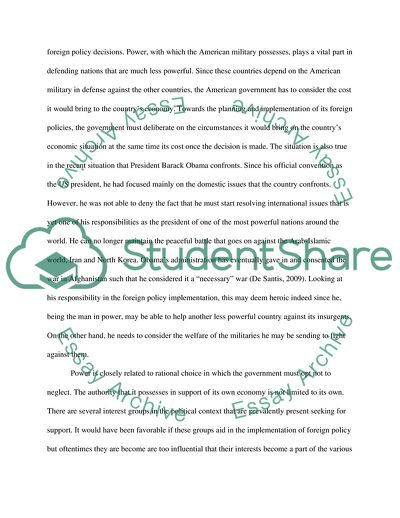
- Home
- Free Samples
- Premium Essays
- Editing Services
- Extra Tools
- Essay Writing Help
- About Us
- Studentshare
- Subjects
- Miscellaneous
- Comprehensively and systematically analyze the role of the domestic political context in foreign policy making and implementation
Comprehensively and systematically analyze the role of the domestic political context in foreign policy making and implementation - Essay Example

- Subject: Miscellaneous
- Type: Essay
- Level: Ph.D.
- Pages: 4 (1000 words)
- Downloads: 0
- Author: daniela91
Extract of sample "Comprehensively and systematically analyze the role of the domestic political context in foreign policy making and implementation"
In a study conducted by Ellis (n.d.), she identified three factors affecting the degree in which domestic politics affect foreign policy – that are power approach, rational choice theory, and institutionalism. Given the power to rule the nation, another role that a US President must responsibly partake is maintaining a diplomatic foreign relationship. The power that he possesses allows him to make foreign policy decisions that does not limit to international relations but to their own country as well.
Farnham (n.d.) cited Lasswell and Kaplan (n.d.) such that according to them, “conduct is political in the degree that it is determined by considerations of power.” In addition, he pointed out that power is undeniably connected to domestic political context (Farnham, 1997). Dealing with foreign policy issues involve not only the international situations at hand, but it includes the various considerations wherein domestic political circumstances are compromised. Decision-makers – that is, the president, must take into account whether the decisions he make are acceptable in the domestic politics.
There were evidence found that support this claim concerning the economics issue. Local economic issues were found to put pressure in the executive and legislative bodies of the government affecting the implementation of certain foreign policy decisions. Power, with which the American military possesses, plays a vital part in defending nations that are much less powerful. Since these countries depend on the American military in defense against the other countries, the American government has to consider the cost it would bring to the country’s economy.
Towards the planning and implementation of its foreign policies, the government must deliberate on the circumstances it would bring on the country’s economic situation at the same time its cost once the decision is made. The situation is also true in the recent situation that President Barack Obama confronts.
...Download file to see next pages Read MoreCHECK THESE SAMPLES OF Comprehensively and systematically analyze the role of the domestic political context in foreign policy making and implementation
Impact of Standardization and Harmonization of Accounting Standards
WTO Dispute Settlements and Members' Legal Capacity
The Extent of the Benefits of Adopting International Financial Reporting Standards
Chinese Government's Control of the Internet
Human Rights Violation in Nigeria
International Construction Contracts and Issues
International Peace and Security - United Nations Charter
Global Sourcing of International Construction Companies in the Middle East and North African

- TERMS & CONDITIONS
- PRIVACY POLICY
- COOKIES POLICY